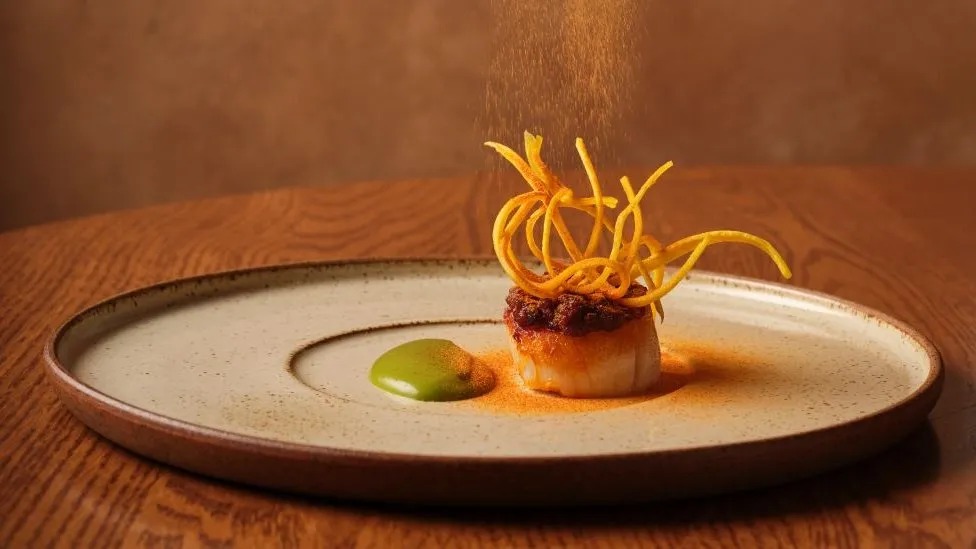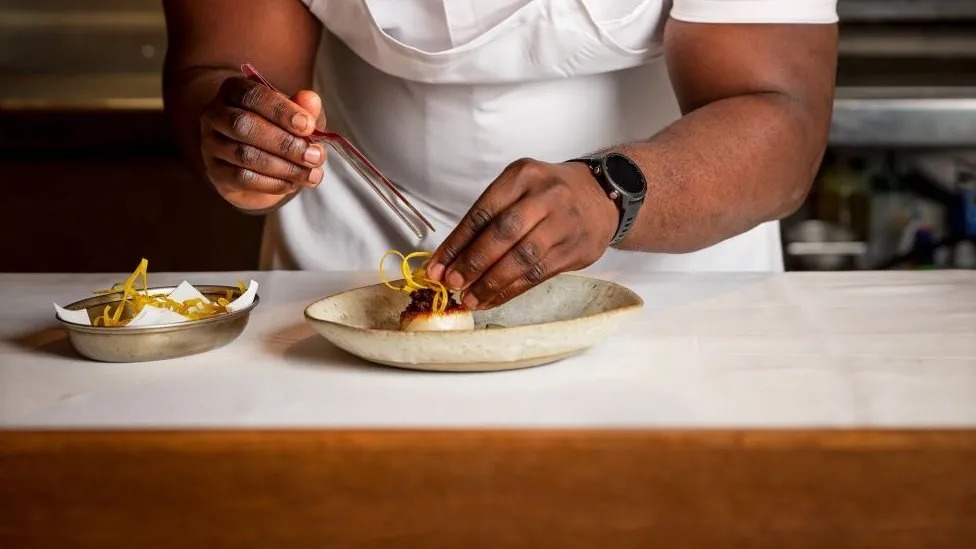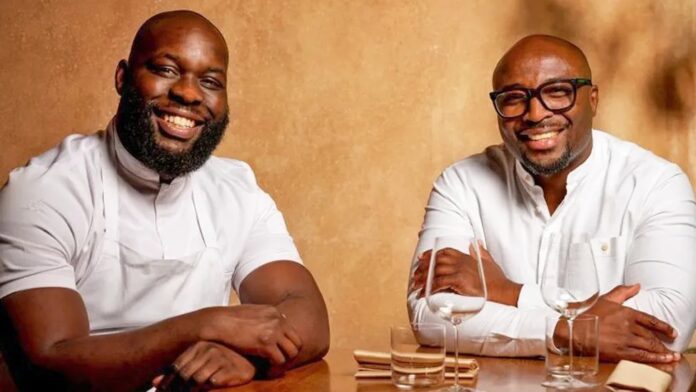Tender, buttery, spicy cow tongue is one of the dishes delighting diners at a high-end West African restaurant in central London.
The thinly sliced meat is seasoned with suya, a traditional Hausa spice, grilled over firewood and served with a creamy bone marrow emulsion on a ceramic plate inspired by Nigeria’s late renowned potter Ladi Kwali.
It is the signature dish of the newly minted Michelin-starred restaurant Akoko.
A Michelin star is awarded to restaurants around the world “offering outstanding cooking” – and Akoko is one of the three with a West African heritage head chef to receive the highly sought after and prestigious honour in the last year alone.
“This is just the icing on the cake,” Akoko’s executive chef Ayo Adeyemi told the BBC.
Around the corner from Akoko in London’s Fitzrovia neighbourhood another West African chef is also basking in pride.

Adejoké Bakare is a self-taught chef from Nigeria whose Chishuru restaurant also received a Michelin star at a ceremony in Manchester earlier this month.
She made gastronomic history, becoming the first black female in the UK to win a star and just the second in the world.
“People can connect to that fact that we are sharing our heritage and people can see themselves on the table,” she told the BBC about her accolade.
Ms Bakare hopes this recognition means Michelin will “start looking at the continent”.
The award, widely considered the barometer of gastronomic success, has been criticised for being overwhelmingly skewed towards restaurants with white male chefs and for lacking inclusion when it comes to African cuisine.
“We are only looking for the restaurants proposing the best food regardless of category,” the UK Michelin chief inspector, whose identity is a closely guarded secret, told the BBC.
“Our restaurant selections reflect the culinary diversity and evolution of the food scene,” the inspector added.
“Chishuru and Akoko are therefore an illustration of the growing diversity of London’s fine dining scene.”
It is evident that jollof rice, egusi soup (made from melon seeds) and moi moi (puréed black-eyed peas) – among other traditional West African food present on Akoko’s and Chishuru’s menus – have now captured Michelin’s palate and attention.
This is not only limited to UK restaurants.
Parisian restaurant MoSuke, opened by celebrity chef Mory Sacko, was awarded a Michelin star within months of its opening in 2020 – the inspectors in France praising the successful fusion of his Malian and Senegalese roots with a Japanese twist.
It was the first Gallic nod to a restaurant with a mainly West African menu.
Last year, comments by British actor Will Poulter went viral with his criticism of the Michelin system and how food of African origin tended to be underrepresented at the fine-dining level
The 31-year-old had just starred in the second series of the acclaimed US TV drama The Bear – about a chaotic sandwich shop in Chicago run by an award-winning chef.
“There’s a massive oversight of food of African origin and black chefs in general,” he said.
Things seem to be turning around, though it is a slow process, says Georgiana Viou, a chef from Benin based in France.
“I have heard several people say that African cuisines don’t have a place on gastronomic tables,” the 46-year-old told the BBC.
But Rouge, the restaurant where she is head chef in Nîmes, southern France, received a Michelin star last year.
It has a Mediterranean menu with a Beninois influence – introduced through “dja”, a traditional tomato sauce offered to all diners at the beginning of their meals.
This is Ms Viou’s way to “change mentalities” about food from Africa.
But seeing Akoko and Chishuru “serving 100% West African” food receive a Michelin star “sends out a strong signal”, she says.
“I have a secret dream of opening a restaurant with even more West African and Beninois cuisine.”
According to Mr Adeyemi, whose parents hail from Nigeria, where he spent time as a child, this growing interest in West African food stems from the region’s growing global cultural domination – think Afrobeats.
“This interest translates to food. What is one way of experiencing someone’s culture [other] than through food?” the 34-year-old asks.
He takes diners at Akoko on a culinary expedition through Ghana, Nigeria, Senegal and The Gambia.
“We tell a journey and a story with the food. But it is not just the food itself,” the chef says.
This is a nod to Akoko’s founder Aji Akokomi. The 46-year-old Nigerian, who came to the UK in his twenties, has overseen the feeling of West Africa in the restaurant’s design – every detail meant to mirror the cuisine.
An imposing two-toned black and brown Ghanaian drum greets people as they are ushered to their tables.
There is a large floral centrepiece of dried palm leaves and African flowers, with the restaurant’s rustic clay walls evoking the atmosphere of an African village.
For Mr Akokomi, this is all meant to conjure the feeling of “ajosepo”, which means community in Nigeria’s Yoruba language – highlighting all that “Africa can offer”.
Both Mr Akokomi and Mr Adeyemi set out to create a menu with their mothers and aunties in mind.
For Mr Adeyemi, every spice, ingredient and dish is an ode to his mother who he said was his “first inspiration”.
He defines West African food through these three classic flavours: smoke, heat and savoury umami.

Many African restaurants in London have thrived outside the fine dining space like Chuku’s, Beyoncé’s favourite in north London, or Enish – the largest Nigerian franchise restaurant in the world with branches in the UK and Dubai.
But those behind Akoko wanted to push the boundaries of what African cuisine could achieve – opening it up to a new diners, while staying true to its roots.
“We take inspiration from authentic dishes and flavours and present it in a unique way,” Mr Adeyemi says. “Our food is approachable to a Western palate and recognisable to an African palate.”
Curtis Mccalla, the Jamaican sous chef at Akoko, welcomes the inclusion of African cuisine by Michelin.
“It is about time,” he says – momentarily stopping chopping fish as the kitchen behind bustles ahead of the lunchtime sittings.
The Akoko team works like a well-oiled machine as the clock runs down to noon, when smooth African jazz fills the restaurant preparing for their first guests of the day.
With the firewood burning, the Nigerian Guinness chilled by the in-house sommelier, the chefs in their whites gather in the stainless-steel kitchen for a brief team meeting. Afterwards they all clap, the door is opened and feasting begins.
Source: BBC NEWS


